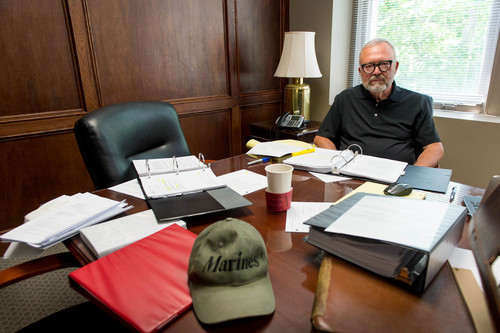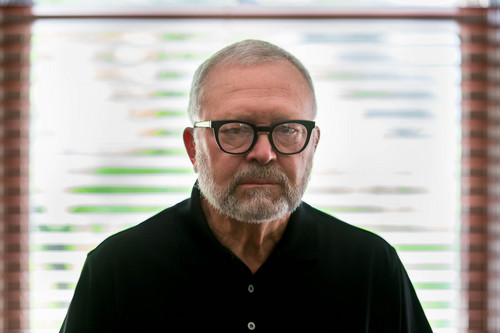This is an archived article that was published on sltrib.com in 2014, and information in the article may be outdated. It is provided only for personal research purposes and may not be reprinted.
An Oklahoma City woman who lost her two young grandsons in the 1995 bombing of the Murrah Federal Building testified Wednesday that her nearby apartment building had exterior surveillance cameras facing the federal building.
Jannie Coverdale also testified that an Oklahoma City police officer and an FBI agent came to Regency Tower, which is west of the Murrah Building, more than six months after the bombing. The police officer told her the two were going to the fifth floor to review the surveillance tapes, she said.
Coverdale is one of three witnesses who testified in Utah federal court via video conference from Oklahoma City in a lawsuit filed by Salt Lake City attorney Jesse Trentadue. The other two testified that they saw cameras on the Murrah Building, either in the months before the blast or on the day of the explosion.
The trio appeared as witnesses for Trentadue, who believes a video of the bombing exists and the FBI has failed to conduct an adequate search to find it and other records in response to his Freedom of Information Act (FOIA) request.
The agency insists that it has thoroughly searched its massive archives on the bombing investigation and that it has no tape of the explosion or the other materials that Trentadue claims exist but have not been provided to him.
On Wednesday, Coverdale testified she walked her grandsons, 5-year-old Aaron and 2-year-old Elijah, to the day care center in the Murrah Building on the morning of the bombing, then continued to her job two-and-a-half blocks away. She dashed back to the building after the blast but never saw her grandsons alive again, Coverdale said.
At McVeigh's trial, which was held in Denver, she asked an FBI agent whether others were involved in the bombing, Coverdale testified.
"He said, 'We think so and we're looking for them,' " she said.
Responding to questions by Department of Justice attorney Adam Siple, Coverdale said her theory, based on her conversations with people who knew McVeigh, is that he was not alone when he bombed the federal building.
"I think the FBI has covered up a lot of information," Coverdale testified, adding that she believes "there are some guilty people walking the streets."
Another witness, Joe Cooley, testified he saw exterior security cameras while helping prepare a bid shortly before the bombing for his employer to provide security for the Murrah Federal Building.
And Don Browning, a former Oklahoma City police officer who assisted in the rescue effort, said he saw several men wearing FBI jackets removing surveillance cameras and the brackets holding them from the south side of the Murrah Building shortly after the blast.
Coverdale, Cooley and Browning all said under cross-examination that they did not know if the cameras they saw were working at the time of the bombing.
Also testifying Wednesday was Roger Charles, a freelance journalist and investigator who worked for McVeigh's legal defense team. Charles said he believes government documents show there are more videotapes that have not been released.
When asked by Siple about a book he co-authored that says there were no working surveillance systems on the exterior of the Murrah Building, Charles said he unsuccessfully fought against including that passage because he believed it was inaccurate.
The book, "Oklahoma City: What the Investigation Missed — and Why It Still Matters," says the information about the cameras came from a February 1995 General Services Administration report on security at federal buildings. Although there were cameras on the Murrah Building, they were not operational, according to the book.
Trentadue — who filed suit in 2008 against the FBI and the CIA, which since has been dropped as a defendant — is seeking a videotape that he believes shows McVeigh and another man exiting a Ryder truck in front of the Murrah building and the detonation of explosives.
He also wants the original videotape taken by the dashboard camera of the Oklahoma Highway Patrol trooper who arrested McVeigh. The copy he received was edited and does not show the bomber, Trentadue says.
Trentadue is asking for an order allowing him to search for videotapes and documents at FBI locations, including field offices in Oklahoma City and Los Angeles, and requiring the bureau to produce the records he requested.
The FBI says if U.S. District Judge Clark Waddoups does conclude its searches were inadequate, he should allow the agency, rather than Trentadue, to conduct one or more additional searches.
Trentadue believes the records will provide information about the death of his brother in a federal prison in Oklahoma City a few months after the April 19, 1995, bombing that killed 168 people. The death of Kenneth Trentadue was ruled a suicide but his family thinks he was mistaken for a bombing conspirator and killed in an interrogation that got out of hand. Federal officials deny the allegation.
Twitter: @PamelaMansonSLC





